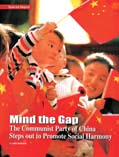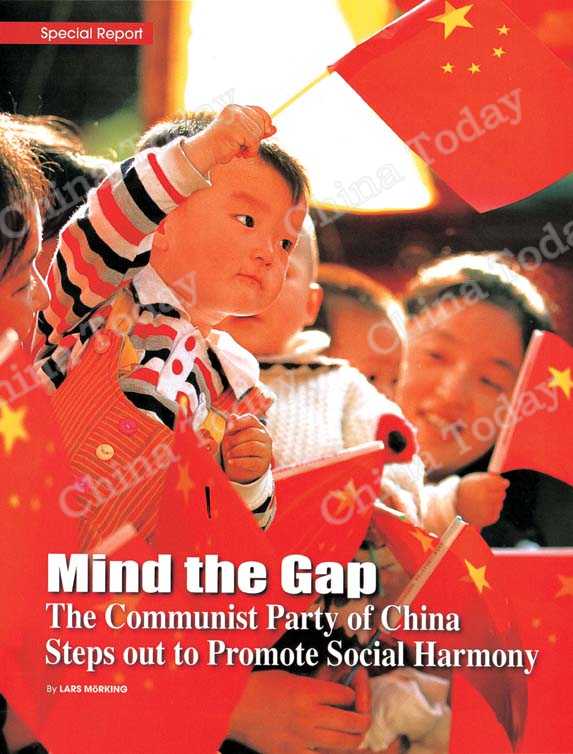
THE Communist Party of China (CPC) ended its five-yearly congress on October 21, 2007, after amending its constitution to include the scientific outlook on development, and electing the new Central Committee. More than 2,200 delegates gathered in Beijing for this week-long meeting, and the Central Committee elected Hu Jintao for a second term as general secretary.
Delegates to the congress approved the amendments to the Party's constitution that incorporate the scientific outlook on development, a concept that places greater emphasis on the environment and China's poor as the nation continues to develop. It broadens the government's focus beyond the economic growth that has brought millions out of absolute poverty, yet at the same time widened the gap between the rich and poor, and between urban and rural residents. Hu spoke of this concept at the opening of the 17th CPC National Congress, the most important political event in China since the last congress in 2002. The words of the country's leader have never carried more weight in the outside world. Hu spoke with pride of the nation's annual 10 percent or more average growth since he took power, vowing to pursue the reforms that pushed China past Britain to become the world's fourth biggest economy. "To stop or reverse reform and opening-up would only lead to a blind alley," he warned.
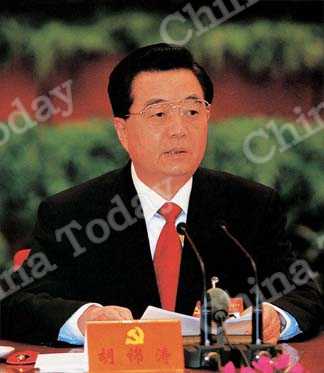
General Secretary Hu Jintao was elected for a second term by the 17th CPC Central Committee on October 22, 2007.
Delegates to the congress approved the amendments to the Party's constitution that incorporate the scientifc outlook on development.
Expansion of "inner party democracy" gives the Party's 73 million members greater opportunity to vote on policy and leadership, and introduces a tenure system for delegates to the congress. The advantage to rural residents of this expanded accountability is their right to elect village chiefs. As General Secretary Hu stated, "Citizens' participation in political affairs will expand in an orderly way." The last day of the party congress saw a further demonstration of the progress of socialist democracy in China. Delegates voted on candidates eligible to sit on the Party Central Committee, electing 204 members and 167 alternatives. More than half of the members, many of whom belonged to the Communist Youth League, are newly elected. Party leaders confirmed that this year's list of candidates gave delegates a far greater degree of choice than ever before.
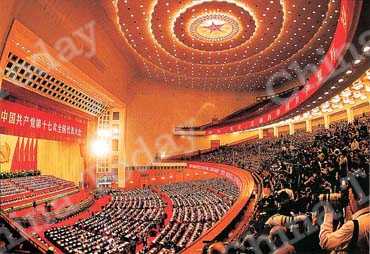
The 17th CPC National Congress was in session in Beijing from October 15 to 21, 2007.
Even China's critics have to admit that, overall, it is one of the few developing countries in the world that is actually developing.
A Developing Country
In the past decades, the Chinese leadership has systematically liberalized the country's economy under the close guidance of the State Council and the CPC Central Committee. Most notable is the way in which reform and opening-up have reconfigured overall conditions and unleashed the powers of the market economy. This transformation has released property, markets and entrepreneurs from the incubator of the centrally planned economy, allowing a socialist market economy to arise from the ashes of the old mode of production. The reorganization of the Chinese state has created a structure of remarkable complexity. Even China's critics have to admit that, overall, it is one of the few developing countries in the world that is actually developing.
Western neoliberal economists stress the positive results of China's economic growth, as manifest in rising incomes, improved housing, more available fundamental consumer goods, and flourishing cities. The CPC leadership, however, also considers the costs incurred by this growth of greater income inequalities, high unemployment, low job security and lacking social services, particularly as regards health care. The environmental costs of economic success, manifest in air and water pollution and high consumption of unrenewable resources, are also severe. Hu Jintao pointed out in his Report to the 17th CPC National Congress: "While recognizing our achievements, we must be well aware that they still fall short of the expectations of the people and that there are still quite a few difficulties and problems on our way forward. The outstanding ones include the following: Our economic growth is realized at an excessively high cost of resources and the environment. There remains an imbalance in development between urban and rural areas, among regions, and between the economy and society."
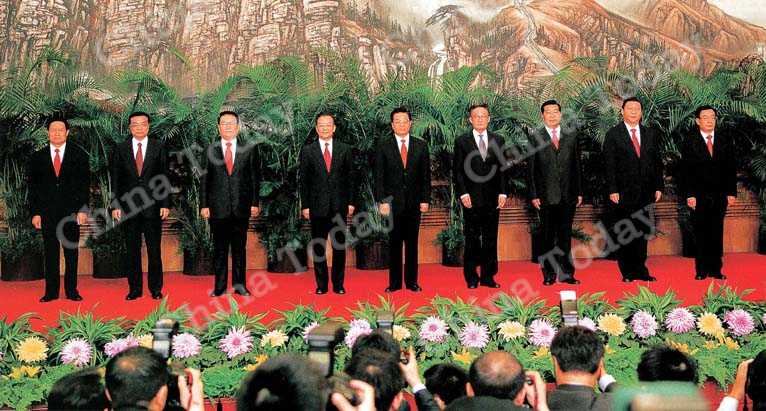
General Secretary Hu Jintao (center) and members of the Standing Committee of the Political Bureau Wu Bangguo, Wen Jiabao, Jia Qinglin, Li Changchun, Xi Jinping, Li Keqiang, He Guoqiang and Zhou Yongkang at the 17th CPC National Congress press conference.
The New Concept
The scientific outlook on development deals with these problems. It looks ahead to the next step in China's strategy to make it one of the world's developed countries by the mid-21st century. The scientific outlook raises the "five balances" concept: those of balancing urban and rural development; regional development; economic and social development; development of man and nature; and the balance between domestic development and opening to the outside world. It is a concept that reflects materialist dialectics, wherein everything is connected in dialectical unity. Development, therefore, is a systematic process in which all aspects are mutually promotive. The scientific outlook emphasizes the need to pay close attention to the overall picture, scientifically formulate plans and consider the interests of all sides, in order to ensure that all aspects link and operate in a balanced manner. The outlook, from the perspective of long-term interests, strengthens development mechanisms. It enhances their quality, ensuring that interaction between the economy and society and between man and nature is mutually beneficial. Scientific development that puts people first and is comprehensive, balanced and sustainable will lead the country towards its goal of a harmonious society, in which prioritized social equity and justice, as well as environmental protection, guarantee sustainable development of the People's Republic of China.
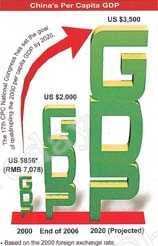


 Copy Reference
Copy Reference 